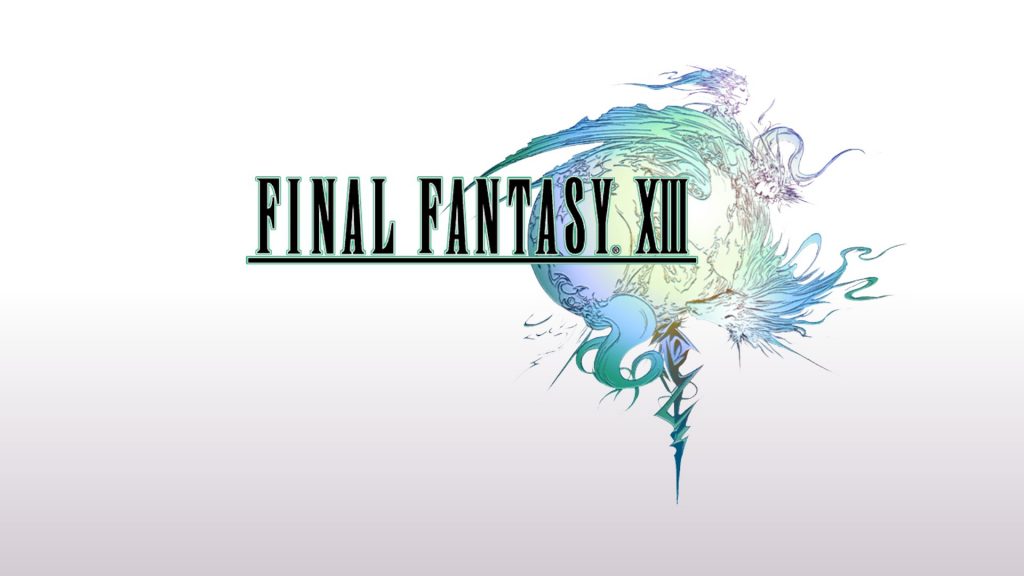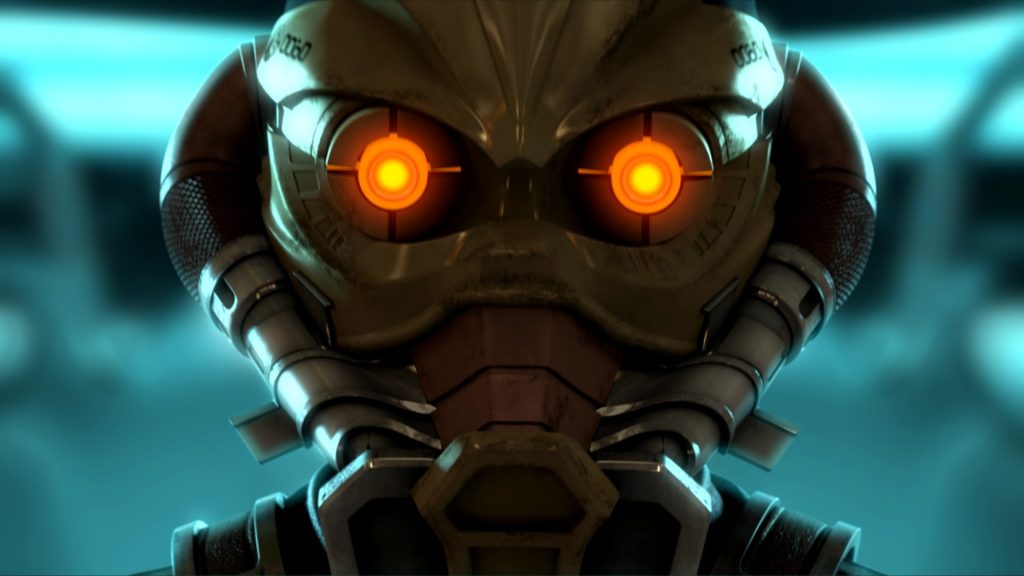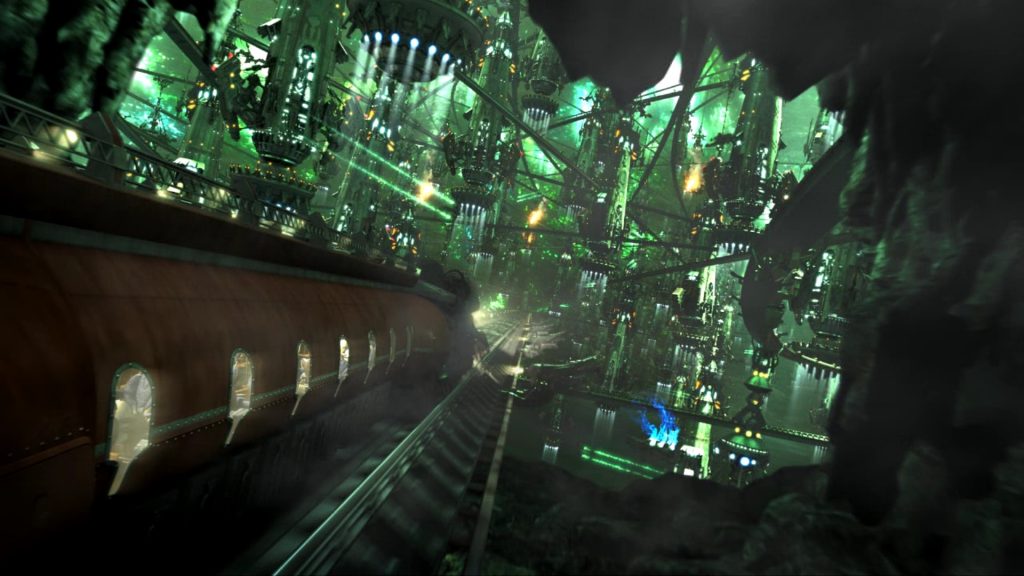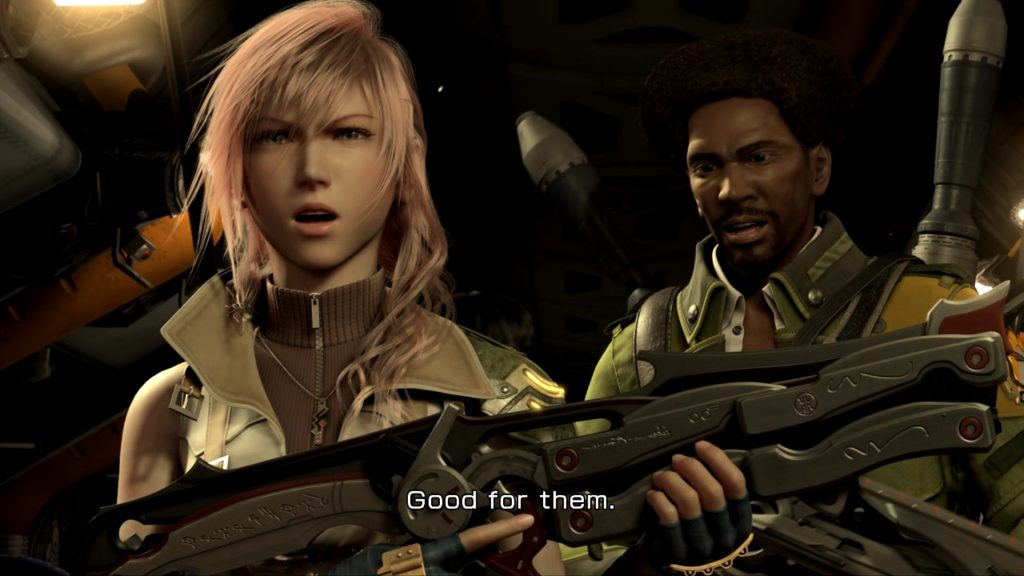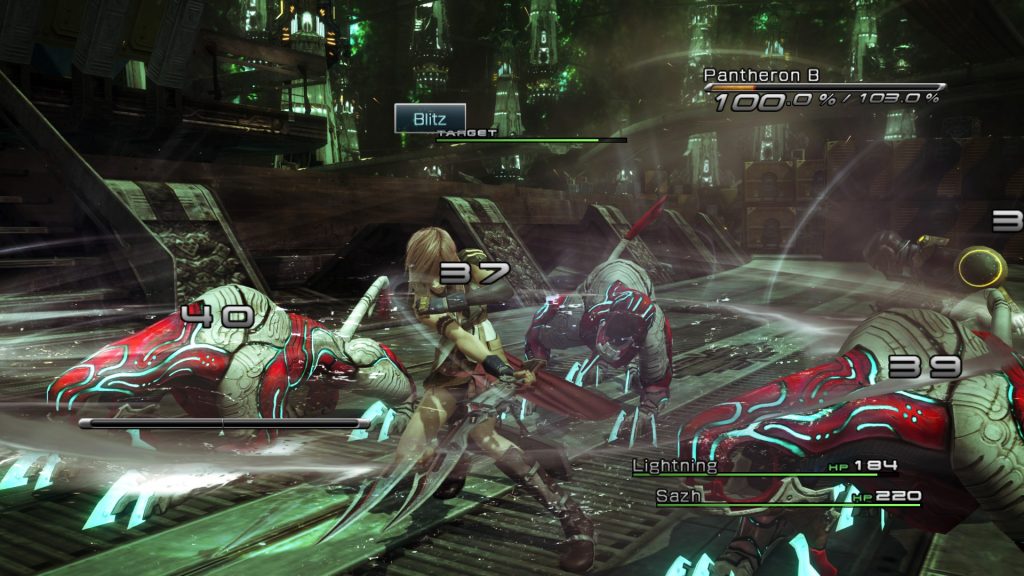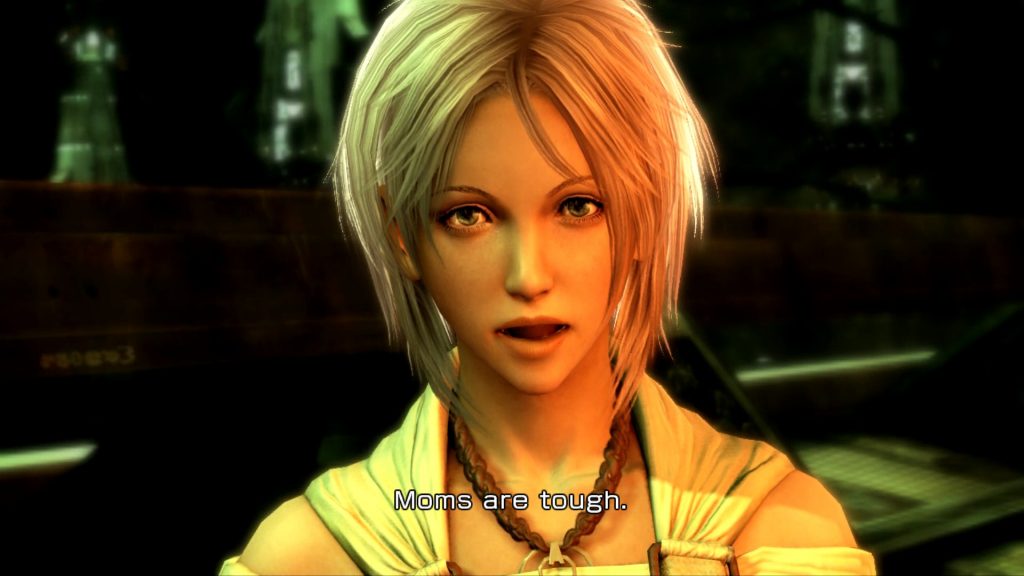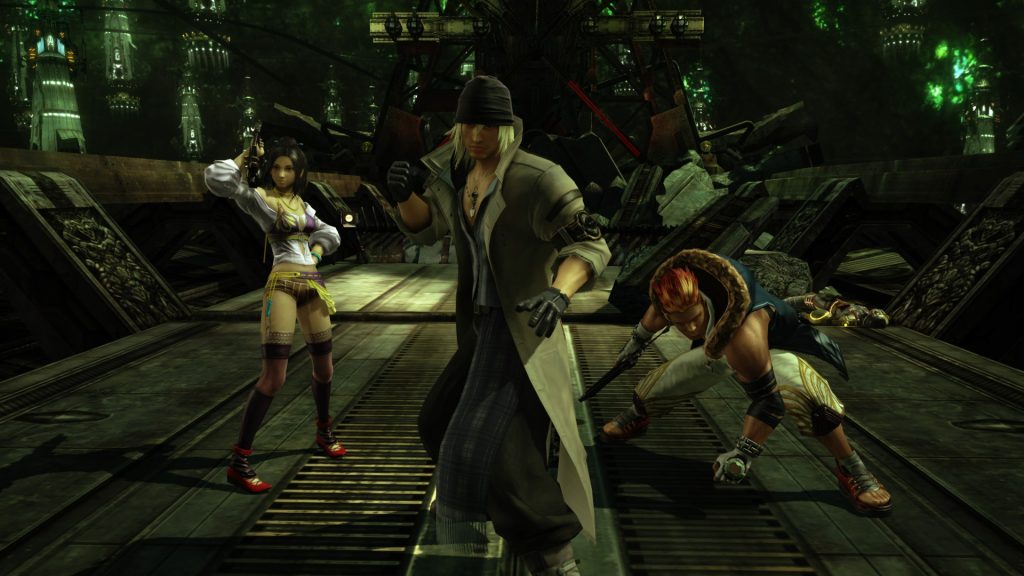I swear, I’ve got like… Stockholm Syndrome with this game franchise.
Arguably, the most notorious yet most successful RPG franchise to date, everyone has at least something to say about Final Fantasy. Old-school gamers croak back to days yonder when they fought Garland on the NES, Millennials bicker about which game had the best romantic couple, and the yuppies of today just breaking into the gaming scene see it as yet another weird JRPG where characters with funny hair run around and cut things. So, bottom line is, how exactly can you tell a good Final Fantasy game from a bad one?
Not that anyone gives a crap, but here is a rough opinionated list of the first 13 Final Fantasy games (excluding 11 as I’ve never played it), listed in order of best to worst, followed by a few of the named main characters so that I don’t just have an awkward list of Roman numerals. Full admittance as well that I (obviously) haven’t come close to finishing FFXIII.
FFVII – Cloud, Tifa, Aeris
FFXII – Vaan, Balthier, Fran (the coolest Vierra ever)
FFXIII – Lightning, Snow, Sazh
FFVI – Terra, Edgar, Locke
FF II – Firion, Maria, Guy, Leon
FF V – Bartz, Lenna, Galuf, Faris
FFIV – Cecil, Rosa, Kain
FF III – Sarah, Desch, Aria
FF I – Garland, Chaos
FF X – Tidus, Yuna, Auron
FF IX – Zane, Vivi, Garnet
FF VIII – Squall, Rhinoa, Seifer
“Get on with it Chezni.”
Right, well anyway, if you study the ebb and flow of the releases, you notice a pattern of focus, partly due to the mechanical restrictions of hardware at the time of release, partly due to what the fans were crying out for at the time, and partly due to the influences of content from any of the titles released prior. Early on, in releases I through IV, the focus was largely on mechanics. In I and III you create your party from scratch–they have no lines, they have no personalities. It’s just “create your party and go.” In II, while your characters are pre-determined, you have absolute control over what “class” they have, because instead of gaining levels or experience points, they simply grow more powerful in a particular area, the longer they commit to actions in combat that support that area. IV was the first to truly railroad party members into specific roles, but it was also the first to branch out and do weird things with classes, like giving them each a special bizzare ability, like Kain’s “Jump” command or Rosa’s “Prayer” command.
Interpersonal motivations, relationships and their influence on the plots were barely important through most of the early titles, with only IV arguably being driven by these sorts of things at all. After all, it’s only shallowly implied that Rosa cares about Cecil, and while Cecil’s journey from Dark Paladin to Light Paladin occupies the first half of the game, it’s arguably not that relevant to the rest of the plot. Likewise, IV in its original release is, in my opinion, the hardest FF from a mechanical standpoint, hands down, further supporting that mechanics were the focus of the first four titles.
With the releases of V and VI, focus swung heavily into the favor of “plot developed” building off the backbone of IV’s success in its personal story focus of Cecil overcoming his dark side. V had a lot more of the sort of flirty “don’t look at me while I’m changing scenes” between some of the characters and was the first to involve cross-dressing, a theme that oddly gets revisited in a few other FF games. This is not to say that the previous FF games didn’t have any story or characters or filler bits. It’s just that in V and VI, the character’s personalities started to matter a lot more. There were a lot more scenes of them interacting with each other instead of boldly driving the plot forward, especially in the case of VI where it feels as if the first half of the game is devoted to character development.
While VI certainly had romance in it, it was never the focus of the tale, nor was it intrinsically tied to the main plot. Locke loved his dead wife and therefore struggled when he fell in love with Celes but if you removed that part from the game the main plot would be unchanged. Likewise, Edgar may have pretended to be smitten with Terra (and to some physical degree, he may have been) but it is revealed later that, he only used it and his other numerous self-proclaimed romances as a cover to hide his loneliness from ruling his kingdom in the absence of his brother and parents.
It wasn’t until VII, VIII and IX where the game started becoming a love story, directly tied to the plot. Ask anyone anything about VII and it’ll be hard not to bring up Sephiroth and Aeris. True, Cloud and Aeris never end up together but VII but the plot revolves around their chemistry and how that was involved with the base plot. VIII was the worst Final Fantasy game both from a narrative and mechanical standpoint but it is the favorite of so very many because they loved Squall and Rhinoa’s relationship, even though I think their dialogue was written by an 11-year-old.
IX followed suit with this new-found love story fashion and presented the romantic couple to the audience within the first few moments of turning the game on. X jumped the shark with Yuna and Tidus but it was easier to stomach in some ways because it was the first FF game to come out on the PS2. This meant it had big beautiful and new graphics, was the first fully voice-acted FF game and had cutscenes that were longer than any amount of time that you would spend actually getting to play the game. There’s a reason that, “You’re playing FFX? I get to hold the controller next!” is a joke.
With the release of XI in 2002, Enix enters what I think of as the Final Fantasy Dark Ages. XI bombed so hard that the creator wrote and publicized an apology to all fans who had bought the game. It didn’t help that the game was released online in a monthly subscription format, which drove fans nuts in two directions. The WOW audience was excited to get to play one of their favorite RPG series online but this left the other half of the fans with barred access–not everyone had good internet at the time or even the ability or willingness to pay a monthly subscription in order to participate in a game series that up until then had never been released in this format.
For four long years, the longest time between the release of any two FF games, Enix remained silent until in 2006 when they released XII. XII was not bad by any means (I feel it was one of the better) but the long years of silence and previous four titles that were so different from the first seven had already alienated many of the older fans causing them to lose interest. The problem too was that XII’s plot was no longer that of a love story, which in turn alienated those who were drawn to the series to get their soap opera kicks. Another three years passed and Enix releases XIII, bringing us to the title we look at now.
I have to say… I’m not disappointed.
A lot of friends I’ve talked to have not liked this game and that’s fine. A lot of people I’ve talked to have hated XII and loved VIII, so it’s clear to me that there are just varying opinions in the matter. This does leave me struggling to wrap my brain around and a concept that I have to accept at this point in my life. Final Fantasy (and all games for that matter) is not cohesive. Not even slightly. Just because you like one of the Final Fantasy games does not guarantee you’ll like any of the others. Why? Well just look at the releases. We go from mechanics, to plot, to plot/romance, to soap opera to online to… whatever the heck you would call XII and XIII. Miraculous future-adventure? Story told with using beautiful, larger than life people as the actors? I’m not sure yet. What I am sure of, is that FF isn’t an exclusive playground where you get the same bag of tricks each time. It’s not Call of Duty, or Mario Kart or any of the other games where every release is the same thing over and over again. It’s place where dre–*cough cough*–argh sorry.
*assumes dynamic sentimental-yet-manly voice*
Final Fantasy is a place where dreams go to be born into reality.
Look, I can’t sit here and promise you that FF XIII is any good. I can sit here and tell though that for the first hour, I really liked it. I thought Lightning was beyond cool. I thought Sazh was funny. I liked Snow’s attitude. I liked the weird futuristic world where people wear ridiculous clothing and shoot guns at army men like it’s a normal Sunday afternoon. I like all the over-the-top action and wildly illogical methods of combat. But I didn’t like it because of what they were in themselves–I liked it because of the way XIII did it. After all, all of those things I just mentioned are present in almost any FF game but in XIII, I liked it and when I look back at all the FF titles, for whatever reason, sometimes I like it and sometimes I don’t. I think almost any FF fan out there will be able to build a list like I did and it could look wildly different form mine. It’s just the way life is. Some things resonate with some and not with others. It’s impossible to please everyone.
Recently, I got to see a live showing of Mystery Science Theater 3000, where the actor for Joel came out and answered a few questions from the crowd. One person asked “How do you know when you’ve made a good episode of Mystery Science Theater?” Joel (as that is his name) paused a moment and said “You know, we don’t think of it like that when we work on the episodes. We try to make each and every episode the best we can. We don’t finish one and go ‘Oh, well, they’re really going to like this one ha ha ha,’ instead, we do our best on each one and then send them out to you guys and then you decide which ones were good. You guys are like our curators.”
I guess that’s really how things go. Enix never set out to make a “bad” FF game. They just set out to make a good game and then individual people decide whether they liked it or not. Sometimes collectively we can all agree on certain aspects of certain games, like “Sephiroth is a badass” or “Yuna is incredibly sweet” or “Vivi is cool,” but in the end, “good” and “bad” in these cases can be largely subjective. After all, my favorite example, Aidyn Chronicles is a horrible game and yet I am not alone (just do a quick search online) when I say that it is one of my favorites.
I’m rating this at Tier 1 but that isn’t me saying its an amazing game, it’s just me saying “I liked this and I want to see more of it.” I know I didn’t discuss the game much but I’m not sure I wanted to. People have broken down piece by little piece every single FF game and I’m not sure that I’d have anything value to say about any one individual game. In a way, when something becomes this popular, it’s almost doomed to failure as the pressure to succeed and expectation to make every single one of your fans happy becomes enormous. Regardless of whether you like a specific FF release or not, Enix does at least have a history of making beautiful games that are always trying new and wacky things on the foundations of their older ones. We as consumers don’t have to get angry when we don’t like one and we don’t have to fight a crusade if we do like one. They’re simply the expression of one person’s wacky dreams into a form they can share with you. We should appreciate that more often.
